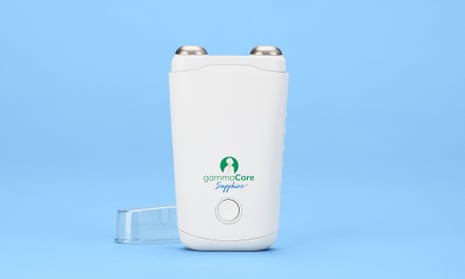A small, portable device that can zap away cluster headaches is being made available to patients on the NHS.
One to two in every 1,000 people have cluster headaches, sometimes known as “suicide headaches” because 64% of sufferers say they think about taking their own life. They involve excruciating pain that can last for anything between 15 minutes and three hours.
Use of the gammaCore gadget is being expanded after successful trials over the last two years. The device is held against the neck and delivers a low-level electric current to block pain signals, relieving pain.
The NHS England national medical director, Stephen Powis, said: “While they may be small, these devices will make a huge difference to people who suffer from these debilitating headaches, relieving painful symptoms and allowing people to go about their daily lives as normal. This is the latest example of the NHS testing the latest tech and rolling it out at speed for patients across the country.”
Cluster headaches begin quickly and are often described as a sharp burning or piercing sensation on one side of the head. Attacks can occur up to eight times a day.
Around one in 20 people who experience them do not respond to traditional treatment including oxygen or painkillers such as triptan, used to ease migraines and severe headaches. NHS England estimates that around 11,000 people could benefit from the gammaCore device.
Patients can use it regularly to prevent cluster headaches or when they feel one starting to come on.
Matthew Whitty, the director of innovation and life sciences for NHS England, said the device “will provide life-changing benefits for thousands of people”.
Cluster headaches are more common in men and tend to start when they are in their 30s or 40s.
Research published in the British Journal of General Practice last year found that people who suffer from this type of headache face years of delay in getting diagnosed because GPs often mistake their symptoms for a migraine or other ailments such as sinusitis, dental problems and eyesight trouble. Sufferers end up unnecessarily having teeth extracted or undergoing a sinus washout as a result of misdiagnosis.
Most sufferers also experience serious psychiatric illnesses such as depression, self-harm and suicidal thoughts during the attacks, the authors of the paper found. A few have even been sectioned under the Mental Health Act because the headache made them psychotic. Around five people a year in the UK with the disorder kill themselves.
